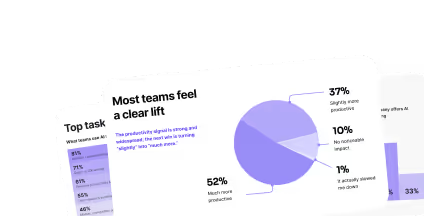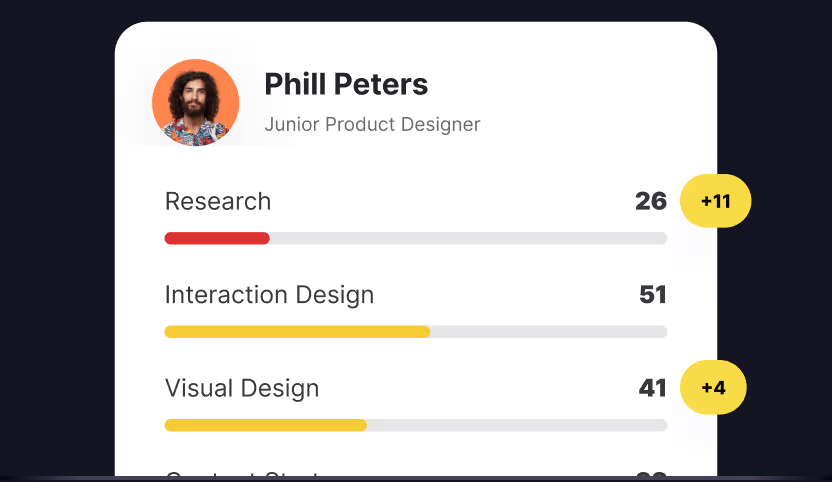Meet Noriyasu: Design manager at Fujitsu
With over a decade of experience in IT, I've built my career collaborating across disciplines, bringing together designers, engineers, customers, and users to craft innovative experiences. My teams have developed solutions spanning mobile UI/UX, robot interactions, and comprehensive design systems that address complex business challenges.
As part of Fujitsu, a global leader in technology and business transformation, I contribute to an organization with a rich heritage of innovation. Our Design Center employs more than 150 professionals engaged in diverse design disciplines including software UI/UX, service design, brand development, hardware design, and customer co-creation initiatives.
The challenge: Breaking down barriers to continuous learning
Leading a cross-functional team of software engineers and designers presented unique challenges in skill development and communication. Our demanding project schedules made traditional intermittent training sessions insufficient for building the consistent expertise we needed. We faced two critical obstacles that limited our team's potential:
Creating sustainable learning habits: Our professionals needed to integrate skill development into their daily workflows rather than treating it as a separate, occasional activity.
Measuring skill progression: Without objective assessment mechanisms, we lacked visibility into current competencies, couldn't set realistic improvement targets, and struggled to provide targeted resources for growth.
The high-pressure technology environment at Fujitsu demands exceptional performance, but our fragmented approach to professional development was creating barriers to both individual advancement and team cohesion. We needed a unified solution that could transform how we approached learning while providing measurable results.
The transformation: Five strategic capabilities unlocked with Uxcel Teams
Implementing Uxcel Teams fundamentally reshaped our approach to professional development at Fujitsu, creating both immediate and long-term benefits for our design practice.
1. Data-driven skill assessment
Uxcel Teams provided unprecedented visibility into each team member's competency profile, revealing both strengths and growth opportunities with objective precision. This quantitative foundation transformed our professional development conversations from assumption-based discussions to evidence-based planning sessions.
With clear skill mapping across the team, we could finally address capability gaps strategically rather than reactively. The objective measurement framework eliminated ambiguity about performance expectations and created a shared vocabulary for discussing advancement.
2. Targeted development conversations
Our regular check-in meetings evolved from general status updates to focused skill development sessions. Armed with detailed competency data, we began setting personalized growth objectives tailored to each team member's unique profile and career aspirations.
The precision of Uxcel's assessment tools allowed us to match learning resources to specific needs with remarkable accuracy. This personalized approach significantly increased engagement as team members recognized the direct relevance of their development activities to their daily work and long-term goals.
3. Streamlined learning resources
Before Uxcel, our teams wasted valuable time navigating scattered learning materials across multiple platforms with inconsistent quality. The unified learning ecosystem eliminated this inefficiency while establishing a shared knowledge foundation across the department.
The centralized platform fostered a vibrant knowledge-sharing culture where team members regularly exchange insights from their learning experiences. These discussions about newly acquired knowledge and unexpected discoveries have strengthened collaboration through shared understanding of design principles and methodologies.
4. Enhanced collaborative culture
Learning became a central theme in our weekly retrospectives, embedding continuous improvement into our team identity. The practice of sharing discoveries and breakthroughs has transformed our department dynamics from siloed work to collaborative problem-solving based on collective expertise.
This cultural shift has improved both internal communication and cross-functional collaboration with other departments. By establishing a common design language and shared understanding of principles, we've reduced misalignment and accelerated decision-making processes.
5. Sustainable learning habits
Uxcel's multi-platform accessibility, available on both desktop and mobile devices, made professional development highly adaptable to diverse work styles. The platform's engaging, micro-learning approach fits naturally into brief availability windows throughout the day, whether during commutes, breaks, or transitions between tasks.
The gamified elements transformed what might have been perceived as obligatory training into an engaging daily practice. This shift from episodic to continuous learning has significantly accelerated skill acquisition across the team while reducing resistance to professional development activities.
Here's how our team's skills grew over time:
Strategic insights for design leaders
Based on our experience transforming Fujitsu's approach to design excellence with Uxcel Teams, I offer two key recommendations for fellow design leaders:
1. Implement strategic skill development planning
Take a structured, metrics-driven approach to enhancing your team's capabilities. Establish clear measurement frameworks for tracking learning progression, and set specific skill development objectives for monthly, quarterly, and annual review cycles.
Align learning resources precisely with each designer's specific needs rather than applying general training broadly. This targeted approach ensures learning investments deliver maximum value while maintaining high engagement through direct relevance to each individual's work.
2. Cultivate sustainable learning habits
Transform professional development from an obligation into an engaging daily practice. Leverage multi-platform accessibility to integrate learning naturally into existing workflows and available time pockets throughout the workday.
By making learning both convenient and enjoyable, you can establish sustainable habits that deliver continuous improvement rather than sporadic skill jumps. This consistent approach builds momentum that compounds over time, creating significant competitive advantage through accumulated expertise.
The broader transformation: Learning as strategic advantage
The implementation of Uxcel Teams has fundamentally changed how Fujitsu approaches design excellence. What began as an initiative to improve skill development has evolved into a strategic advantage that differentiates our capabilities in the competitive technology landscape.
Our design team now operates with greater confidence, clearer communication, and more consistent quality standards. The culture of continuous learning has fostered innovation through deeper expertise and comfort with exploration. Perhaps most significantly, the data-driven approach to skill development has created unprecedented visibility into our human capital capabilities, allowing for strategic resource allocation and career pathing.
By transforming how we approach learning, Uxcel Teams has enabled Fujitsu to build not just better products, but better design professionals, creating sustainable competitive advantage through human capital excellence that complements our technological innovation.





.svg)
.svg)
.svg)
.svg)
.svg)
.svg)
